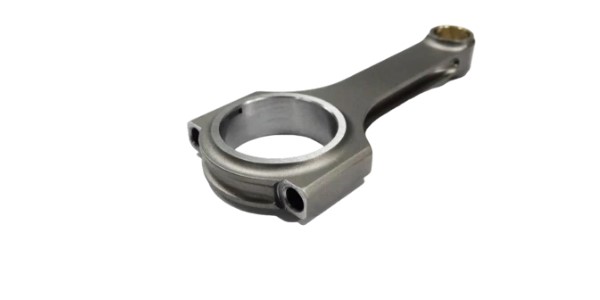Forging Connecting Rods: a term that resonates with strength, precision, and high performance. These vital components serve as the backbone of an engine, with their role in the internal combustion process being nothing short of critical. Crafted for exclusive use in gasoline-powered automobiles and motorcycles, these rods are not designed for diesel engines due to their differing combustion characteristics.
The process of manufacturing forged connecting rods involves shaping metal under high pressure, typically in a forging press or a hammer. The goal is to create a component that can withstand extreme conditions and provide enhanced durability. This process begins with a piece of high-quality steel, heated until it’s malleable. This piece is then subjected to massive pressure, forcing it into the desired shape of a connecting rod. The finished product is then cooled, further enhancing its structural integrity.
In terms of function, connecting rods act as a bridge between the piston and the crankshaft in an engine. When the piston moves up and down, the connecting rod transmits this motion to the crankshaft, converting it into the rotational movement that drives the wheels.
The forged connecting rods are known for their outstanding resilience and longevity. The high-pressure forging process ensures that the metal’s grain flow aligns with the shape of the connecting rod, enhancing its tensile strength and fatigue resistance. This is particularly beneficial in high-performance engines, where parts are frequently subjected to intense stress.
Users of forged connecting rods often report a smoother driving experience. These components provide greater engine stability, reducing vibration and contributing to more efficient power transmission. Furthermore, the exceptional durability of forged connecting rods means they’re less likely to fail under stress, offering users peace of mind and potentially saving them from costly repairs down the line.
Three main types of forged connecting rods are available for specific needs: FD-H type, FD-I-Beam, and FD-X-Beam. Each of these types brings its unique advantages to the table, allowing for customization based on the specific requirements of the engine.
At the helm of connecting rod manufacturing in China, FEDA has carved a niche for itself in the automotive industry. Recognized for their unwavering commitment to quality, FEDA forged connecting rods have become a sought-after component for gasoline engines in cars and motorcycles.
A purchase from FEDA is more than a mere transaction. It’s an investment in a superior driving experience and in the longevity of your engine. FEDA connecting rods are designed with the user’s needs in mind, made to withstand the rigors of high-performance driving. Customer satisfaction is at the forefront of FEDA mission, and their success is reflected in the positive feedback from users, who praise the noticeable improvement in engine performance after installing FEDA forged connecting rods.
One of FEDA distinguishing qualities is their array of offerings. The FD-H type, FD-I-Beam, and FD-X-Beam connecting rods cater to a diverse range of performance requirements. Each type has been engineered with precise attention to detail, ensuring an optimal balance between strength, durability, and weight.
Users of FEDA FD-H type connecting rods, for instance, have reported a robust performance in high-compression scenarios, appreciating the durability these rods bring to their engines. Those who opted for the FD-I-Beam and FD-X-Beam rods have been equally impressed with their engine’s improved ability to handle varying forces, leading to smoother, more efficient operation.
Despite the complexity of their products, FEDA buying process is straightforward and customer-friendly. A dedicated team of experts is always ready to guide buyers, ensuring they choose the right connecting rod type for their specific engine and performance needs.
To reiterate, it is important to note that FEDA forged connecting rods are designed exclusively for gasoline engines in cars and motorcycles. They are not suitable for diesel engines due to the different combustion processes and associated forces involved.
In the end, FEDA stands as a testament to the potential of precision engineering and customer-centric practices in elevating automotive performance. With their forged connecting rods, they continue to enhance the driving experience for countless motorists, reinforcing their status as a leading connecting rod supplier in China. Their unwavering dedication to quality and performance sets a high standard in the industry, underscoring the crucial role of superior components in the realm of engine efficiency and power.
Post time: May-12-2023


